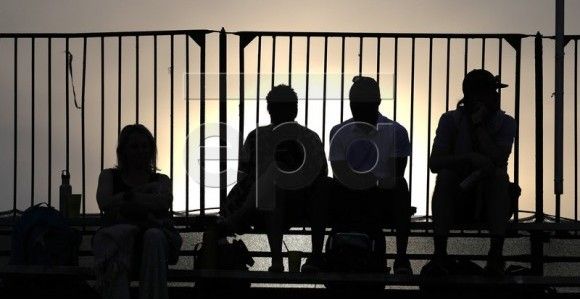TENNIS10SBALLS TAKES ANOTHER LOOK BEHIND THE SCENES @ INDIAN WELLS • BNP PARIBAS
 TENNIS10SBALLS TAKES ANOTHER LOOK BEHIND THE SCENES @ INDIAN WELLS • BNP PARIBAS
TENNIS10SBALLS TAKES ANOTHER LOOK BEHIND THE SCENES @ INDIAN WELLS • BNP PARIBASepa06592580 Fans watch the match between Alex De Minaur from Australia and Jan-Lennard Struff from Germany as the sun sets during the BNP Paribas Open at the Indian Wells Tennis Garden in Indian Wells, California, USA, 09 March 2018. EPA-EFE/MIKE NELSON |
Fans watch the match between Alex De Minaur from Australia and Jan-Lennard Struff from Germany as the sun sets during the BNP Paribas Open at the Indian Wells Tennis Garden in Indian Wells, California, USA, 09 March 2018. EPA-EFE/MIKE NELSON
By Craig Cignarelli
As of this evening, half of the players, who came to play the BNP Paribas in Indian Wells, are finished competing on the court. Some suffered heartbreaking third-setters where a 14-12 tiebreaker decided the win, while others got their tails kicked in. There was screaming at fans, racquets shattered, tirades launched at coaches and more than a cup full of tears. Egos fell upon the sword, confidence eroded and some athletes questioned their entire identities as professional tennis players.
A consequence of this emotional carnage is the garage sale – of coaches, agents, racquet companies, physios – which now takes place inside cafes and bathrooms and on cell phones around the grounds. These athletes drop influencers faster than Hollywood canned Harvey Weinstein. They’ll defend their decision with sound reasoning: there are only a few major events per year and we’ve been working to peak for this and Miami before heading into the clay court season. The difference between first and second prize money is about ten grand, so an early loss hits the wallet almost as hard as the heart.
Thus, there are now several unemployed influencers wandering the grounds in search of new clients. These coaches and agents and physios are ex-athletes who understand the desire to win. They know anything goes in the heat of competition and they’ve a host of tools at their disposal to secure these athletes. Imagine the Serengeti during the migration and you get close.
Picture this, a young athlete has just lost 6-3, 6-3 to a top hundred player and now sits before a bowl of pasta while her father fires her coach and trainer. With Papa off doing the dirty work, several already-been-fired-today coaches and physios circle the girl. A smile, a comment about her meal, a touch on the shoulder to say “good effort today.” These tiny gestures are like a lion pawing at its food. If the prey responds, they pounce.
“Your forehand looked great today but you might try adding some slice on the backhand side.”
“With small changes in your strength, you could be top ten.”
“I’m working with (insert name here) and we need a hitting partner if you want to come out tomorrow.”
Watching this process fascinates. We understand the minuscule margins separating the elite professionals. We hear about the high churn rate for coaches and trainers. We know long-term contracts are almost obsolete. Even in this desert, the athlete believes the grass is always greener. In this realm where confidence is king, an extraordinary amount of insecurity exists. The player hires new help and the process begins anew.
And so, as we enter the second round of competition, there are some intense stories happening off court. The striking of new relationships as players prepare for the next slam, the joining of forces as coaches and players from different continents enter trial periods, the inner growl and upper lip sneer as coaches and athletes pass former employers and employees. The desert down here is dangerous, however there are many oasis called stadiums and I’m on my way for a quenching. Anisimova plays Pavlyuchenkova. I’ve picked this sixteen-year-old to go far here. We shall see.
Editors Note: Today the coaching partnership with Maria Sharapova and Master Coach (Orange Coach) “Dutch Tennis Architect” Sven Groeneveld amicably parted ways. We wish them both well.


10sBalls Top Stories
- Reasons Behind the Increase in Sex Shops
- Reasons Behind the Increase in Sex Shops
- Reasons Behind the Increase in Sex Shops
- Casibom: Yaşayan Casinolar ve Bahisler Lider Platform
- Sea Star Casino: Play Games Without Registering Online
- JETZT DEN SWEET BONANZA SLOT GRATIS DREHEN
- Азартные игры с Мостбет Казино – испытайте удачу
- Çevrimiçi en iyi yuvalar: Hizmetinizde Karavan Bet Casino
- Top No Deposit Free Spins Offer for Canadians – December 2024
- Abe Bet Casino: Ücretsiz dönüşlerle heyecan hissedin
- Ünlü slotlar çevrimiçi kumarhanelerde başarı bet giriş ücretli formatta
- BasariBet Casino Giriş – En Güzel Canlı Casino Oyunlarına Katılın
- Игра на деньги в казино 1вин казино: безопасность
- De parking de credits sans oublier les Diction Casino Archive sauf que Perception
- Играть в хитовые слоты в надежных клубах azino777




